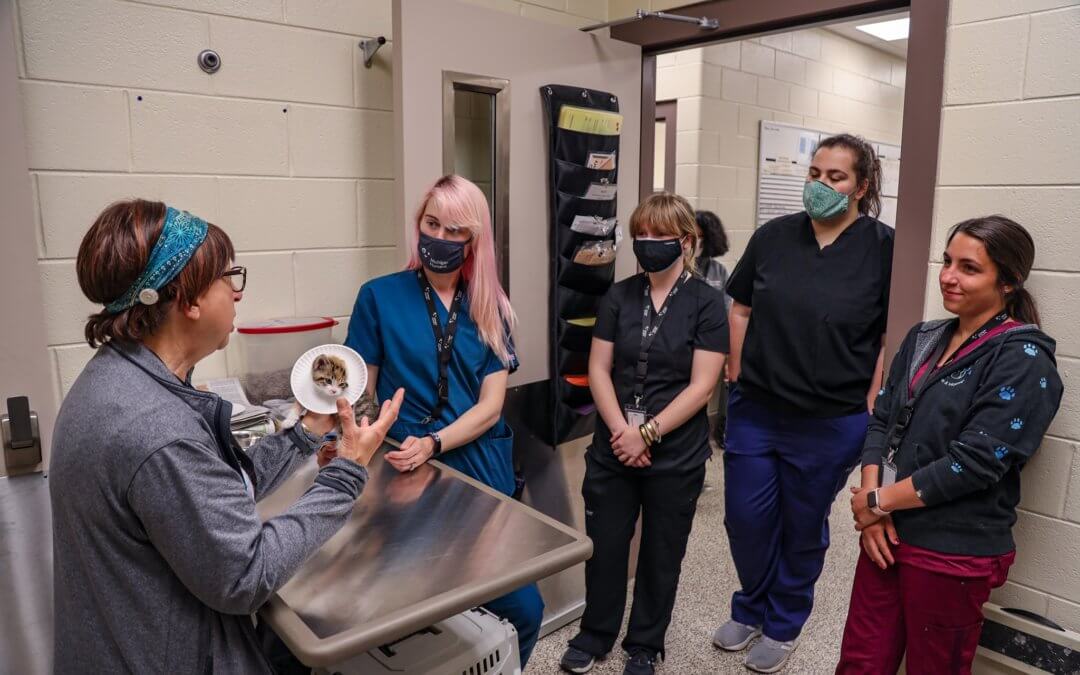For much of my veterinary career, I have been involved in the various aspects of sheltering. I learned early on that I was not a good business person and after three years of practicing small animal and equine medicine in my own practice, I ended up with 7 horses as payment for services and no money. Needless to say, I decided I needed to work for someone else.
I moved back to my hometown of Detroit and accepted a position with Michigan Humane until I could find a “real job.” That was in the days when I was reluctant to tell anyone where I worked as being employed by an animal shelter made you a second-class vet in many people’s minds. I never did get that real job as the sheltering bug bit me early, and I have never looked back. The rest is history and what a difference it is being a shelter veterinarian today.
Let’s look at how shelter medicine has changed.
First and foremost, shelter medicine is now considered to be a challenging, rewarding and highly-skilled aspect of veterinary medicine. We have board certification as a specialty, a vibrant Association of Shelter Veterinarians with over 2000 members and 23 student chapters from around the world, and multiple resources that help guide us in our care for our animals, including the launch of an academic journal focused completely on shelter medicine.
So many more resources are now available to the devoted vets that care for this population of animals. Thanks to some talented, dedicated shelter vets and organizations such as Maddie’s Fund, ASPCA, and the Association of Shelter vets, we have textbooks, webinars, conference tracks and guidelines
There are multiple universities that have shelter medicine departments with internships, residencies and research that focus on ensuring that the animals in our care have the best disease control, housing, enrichment, behavior modification and medical treatment. University of Florida has a masters and certificate program in shelter medicine and veterinary forensics, while UC Davis has the honor of having the first shelter medicine resident.
The universities provide research into advancement of medical issues that are challenges in the shelter, including respiratory diseases, ringworm and parvovirus. Also, from these areas of research, shelter veterinarians learn ways to house animals as stress-free as possible. They also gain understanding that an animal’s mental well-being is as important as its physical well-being and work alongside the behavior team to reduce stress through enrichment and medication if needed.
Our animal shelter veterinarians must be skilled in surgery, medicine, population control, housing, sanitation and behavior just to name a few of the areas that the shelter vet touches. They are experts in disease control, managing outbreaks through sophisticated testing, isolation and quarantines. They are educators to the staff, public and their leadership. Our veterinarians perform not only sterilizations, but mass removals, enucleations, amputations, extensive dentals and orthopedics. They put back together dogs and cats hit by cars and suffering from gunshot wounds and attacks from other animals. They use modern equipment such as high-speed dental drills, digital radiography, anesthetic monitors and bone saws just to name a few.
Another area that has benefited from recent research is veterinary forensics. The International Veterinary Forensic Sciences Association has been instrumental in advancing research into veterinary forensics and has published guidelines for veterinarians to follow. This assists those shelter veterinarians that work with law enforcement to improve their skills at being the voice for the voiceless in successful prosecution of animal abuse and neglect.
Recently, shelters, along with their veterinarians, are focusing on community programs and keeping animals in their homes. The shelter vet is an integral part of the movement to keep pets out of the shelter by being a medical resource for those with limited funds and will continue to be instrumental in advancing humane communities. To that end, at Michigan Humane, we have a robust externship and summer job program where students interested in shelter medicine gain valuable hands-on experience in our facilities as we hope to develop the next generation of shelter vets!
Photo credit: Michigan Humane


